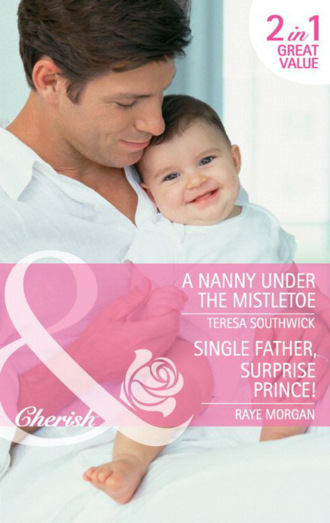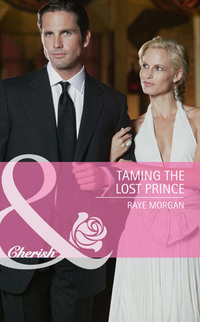
Полная версия
A Nanny Under the Mistletoe
She blew out a long breath. “Worn out. We’ve been here a long time. You got my messages?”
A muscle jerked in his jaw. “Yeah. I need to give permission for treatment.”
She nodded. “You could have done it over the phone.”
“I’ve never handled something like this. It seemed better to show up.”
“The pediatric trauma specialist—Dr. Tenney—looked at her hand and said no nerves or tendons or anything that would permanently affect her fine motor coordination were compromised.”
“That’s good,” he said.
“It is, but she needs stitches, because of where she cut herself. Movement in her palm will make healing take a lot longer unless he closes the cut.”
His mouth thinned to a grim line. “Something like this never crossed my mind. How did you handle stuff while she was with you, after Charity and Ben left?”
Libby met his troubled gaze. “I had power of attorney. I was authorized to approve routine check-ups, visits to the doctor’s office and whatever came up. When they died everything changed. You’re her legal guardian and I couldn’t sign any of the forms. So we’ve been waiting—”
Her voice cracked and the weakness shamed her, making her more self-conscious.
“Libby, I’m sorry. I had no idea.”
“Your secretary said her orders were that you not be disturbed. She’s very good at her job.”
“Still—” He ran his fingers through his hair. “This should have been an exception.”
He looked sincere, she thought. And in all fairness this was a situation she hadn’t foreseen. The fact that she’d had a lot on her mind, including him, was no justification for her not to consider what would happen in a medical emergency. But it also made a certain amount of sense that his employees who worked so closely with him knew him better than anyone. Knew his priorities. If a child who needed medical treatment was an exception-worthy event, the woman would have put Libby through to him. She hadn’t. And that didn’t speak highly of his attitudes toward parenting.
Morgan stretched and opened her eyes. “Hi, Uncle Jess.”
“Hey, Morgan. How are you?”
“Not good.” She glanced at her hand. “I got a boo-boo.”
“I heard. Does it hurt?”
“Not really,” she said. “Want to see it?”
His hesitation wasn’t all that obvious, but Libby saw. “Sure.” He lifted the small surgical drape covering the little hand and winced, turning a little pale. “It looks like it hurts a lot.”
“If I hold really still it’s okay.” Morgan’s eyes filled with tears. “But I’ve been holding still for a long time. I wanna go home.”
“Can’t blame you,” he said. “I’ll go do what I have to do to make that happen.”
Libby watched him disappear and aloneness surrounded her again. Wasn’t she the perverse one? Jess was damned if he did, damned if he didn’t. She didn’t trust him with this child, but Libby was desperately drawn to his strength and support.
Not more than a few minutes later Jess returned. “Okay. Everything is taken care of. The doctor will be here in a few minutes to fix you up and pretty soon you can go home.”
“Thank you, Uncle Jess.”
The small, sad voice brought a pained look to his face. “Morgan, I’m very sorry you had to wait so long.”
“That’s okay.”
“No, it isn’t,” he said. “I didn’t get the message and it’s my responsibility to let the doctor know he can do what’s necessary to make you better. I was in a meeting.”
“Was it important?” Morgan asked.
“Yes. It means lots of people will have jobs.”
“That’s pretty important,” the little girl agreed.
Jess shook his head. “My secretary didn’t give me the message.”
“Why not?”
“Because I told her not to.”
“You made a rule?”
“I guess you could say that.” He reached out with one finger and brushed a stray strand of hair from her cheek. “I just want you to know that I’m very sorry you had to hang around here so long.”
Libby waited for him to say that nothing like this would ever happen again. He didn’t. She knew Jess took a promise very seriously and the flip side of that was not to make a vow you couldn’t keep. But this was one that he should move heaven and earth to make and not break.
“So,” he said, looking down at Morgan. “Other than this trip to the emergency room, how was your day?”
“Okay.” The small smile she’d given him disappeared. “But I’m scared about gettin’ stitches.”
“I can see where you would be,” he said seriously. “But I’ve had them before.”
“Really?” Her eyes widened. “Is it gonna hurt?”
“The doctor is going to give you some medicine that will make you not feel anything.” He held up his finger. “But here’s the thing. The medicine comes through a needle, a really small one and it will feel like a little pinch. Then it might burn for a couple of seconds. After that, you won’t feel anything.”
“Promise?”
He made the cross over his heart and held up two fingers. “Swear.”
He’d told her the truth, Libby realized. It would have been easy to lie and tell her it wouldn’t hurt, but he hadn’t done that. Which made his omission about promising to be accessible to Morgan all the more significant. If he couldn’t make that promise, Libby would see to it that nothing like this ever happened again. She’d make sure that if Morgan needed anything she wouldn’t have to wait. Maybe it was time to do something she’d been considering for a while—consult a lawyer about her alternatives for obtaining legal custody of Morgan.
He’d cited his sense of duty, but in her opinion love should trump obligation.
She didn’t ever want this little girl to wait for what she needed until Jess could find time to be available. She didn’t ever want this precious child to feel like an unwanted obligation. Libby knew from firsthand experience how painful growing up that way could be.
Twenty-four hours later things were back to normal, whatever that was. Morgan was in the Nooks and Nannies after-school program, where she was being watched over and pampered so Libby had felt confident in resuming her teaching duties. A lot of parents counted on child care and the kids could be thrown off by a substitute. If Morgan needed her, she was right down the hall, as opposed to Jess, who had meetings and left orders not to be disturbed for any reason.
Still, after he’d arrived at the emergency room and expedited the little girl’s treatment, he’d been great, making her laugh, distracting her while the doctor stitched her hand. Then he’d taken them home, with a detour to a toy store where he bought what he’d called her brave-little-girl reward. Libby had experienced the E.R. with and without him and definitely preferred him there. Which was a bummer since he couldn’t be counted on to show up when needed.
Her classroom door opened and Sophia Green walked in. “Hi, Lib.”
Her stomach clenched. “Is Morgan okay?”
“Fine. I just checked on her.” The preschool director sighed. “Are you going to the bad place every time you see me now?”
“No.” And that was a big fat lie.
“Give it time.” She sat in the chair beside the desk. “Morgan says her hand doesn’t hurt. I think that very impressive bandage is helping in that regard.”
“Good. She does like her Band-Aids.”
“Miss Connie is keeping her quiet. Which isn’t really all that difficult.” Sophia frowned. “How is Morgan coping with losing her parents?”
Libby thought about the question. “Fine. She seemed to take the news okay and was a trouper at the memorial service.” Now Libby frowned as she mulled it over. “But she never asked many questions and now she doesn’t talk about them at all.”
“I see.”
But Libby didn’t miss the deepening worry lines. “She’s had to cope with moving. Jess is practically a stranger to her. That’s a lot for a little kid to deal with.”
“How’s the arrangement working out?” Sophia asked. “I mean you being her nanny.”
“You mean what’s he like. Admit it.”
Sophia shrugged. “I think it’s perfectly normal to be curious about an above-average-looking wealthy man that my friend is living with.”
Wow, that was an understatement in every way. Jess was drop-dead gorgeous and the penthouse lifestyle didn’t happen without a couple extra bucks in the bank. But the “living with” part made the arrangement sound way too personal.
“I’m not living with him—”
“So you commute there to fulfill nanny duties?” Sophia’s expression was all innocence except for the gleam in her gray eyes.
“No. I’m a live-in nanny.”
“So, how is that working for you?”
It was Libby’s turn to shrug. “Nice place. Morgan doesn’t want for anything that money can buy.”
“I hear a but.”
“Let’s just say it’s a good thing I’m a live-in nanny,” Libby hedged. “For Morgan’s sake.”
“Are you concerned about her welfare?”
“Yes.”
“Why?” Sophia persisted.
“For starters, sexy stewardesses show up with their own key and let themselves into the penthouse.”
“Why would they do that?”
“Oh, please.” Libby rolled her eyes. “You’re a grown-up. Do the math.”
“They drop by for…” Sophia thoughtfully tapped her lip. “Benefits when they’re in town.”
“Right in one.”
“And you’re jealous.”
Not a question mark anywhere near that statement. How irritating that she was so easy to read. Instead of outright denial, Libby attempted a flanking maneuver. “Why in the world would I be jealous?”
Sophia linked her fingers and settled her hands in her lap. “Because he’s a hot guy and you have a crush on him.”
“Give me credit for some maturity.” Again not a lie.
“Age has nothing to do with it. Secretaries fall in love with their bosses all the time. And the nanny falling for the guy she lives with is the stuff of romantic fantasies from Jane Eyre to The Sound of Music.”
Libby thought about confessing that her crush wasn’t a recent development and had happened years before she’d moved into the penthouse, then decided a lie was easier. “You couldn’t be more wrong.”
“It wouldn’t be the first time,” her friend conceded. “So, you’re concerned because a sexy stewardess with a key is bad because there’s a child in the house.”
“A child who subsequently decided when she grows up, she wants to be a redhead with big boobs.”
“Oh, my.”
“No kidding.”
“That’s unfortunate, Lib, but give him the benefit of the doubt. This is a major lifestyle change for him.”
“I get that.” Libby picked up her pen and rolled it between her fingers. “If that was the only thing, I’d shrug it off. But he’s a workaholic. His priorities are budgets and business models. What concerns me is that so far he’s shown no inclination to change his lifestyle to accommodate Morgan.”
Sophia nodded. “That’s a concern.”
“Yeah. Charity and Ben took care of all the details before they left. They dotted Is and crossed Ts. Their decisions were made with abundant thought. And it begs the question—why did they trust me with Morgan for the short term, but make Jess her long-term legal guardian?”
“I can’t answer that.” Sophia studied her. “What are you thinking?”
“I’m just wondering who would be the better parent,” Libby admitted.
“As in changing the custodial status quo?”
“It’s crossed my mind. I have an appointment with an attorney.”
Sophia sat forward, her expression shocked. “You’re talking about suing for custody?”
“I haven’t really thought about it in those terms or that far ahead.”
“Have you talked to Mr. Donnelly? Maybe he would be willing, possibly relieved, to step aside. It’s possible you’d be doing him a favor. You might be able to work out a mutually agreeable solution.”
Libby clicked the top of the pen, sending the point in and out. “Before moving Morgan, I tried to talk to him and couldn’t get access. Rich people have a lot of insulation.”
“It’s probably because they need it,” her friend commented. “There are probably a lot of folks who’d like to separate him from a million or two.”
That was a good point and something Libby hadn’t considered. “I suppose it’s not easy to trust when you’re in his position. But I tried to talk to him when I brought Morgan, that very first day. He adamantly refused to even consider altering custody. Said he promised his friend.”
“Sounds awfully noble to me.”
Libby would have thought so, too. Except Jess had put a finer point on it and called Morgan a duty. But then, in the E.R., he’d been so sweet with her. Probably guilt for not being available to authorize her treatment. And yet his interaction with her had seemed to be completely natural. It was so confusing and she didn’t know what the right thing was anymore.
“What I know for sure is that I love that little girl like she’s my own. For me, walking away isn’t an option. I just want to talk to an attorney and find out what my options are—if any.”
Sophia nodded thoughtfully. “If he doesn’t voluntarily agree to walk away, you could be talking about a legal battle.”
“I know.”
“It could get expensive,” her friend pointed out. “No could about it. We’re talking lawyers and protracted legal proceedings. All of that can add up fast.”
“I get it.”
“He’s got unlimited funds and you—”
“Don’t,” Libby finished for her.
But technically she was working two jobs and saving every penny possible. Just in case.
Sophia studied her for several moments. “I hope it doesn’t come to that.”
“Yeah. Me, too.”
But Libby wouldn’t run away from it either. If she decided to go that route, it would be because that’s what was best for Morgan.
“I have to go. So much paperwork, so little time.” Sophia stood and looked down. “I have just one thing to say.”
“Do I want to hear this?”
“Doesn’t matter. It’s not directly about you.” She smiled. “Morgan is a lucky little girl.”
That surprised Libby, what with losing her parents and all. “Why do you say that?”
“Two good people care enough to be there for her. You and Mr. Donnelly are ready and willing to make sure she’s got everything she needs. He’s got the money, you’ve got the emotional thing going on.”
“That’s what Ginger said. It’s how I came up with the idea to be his nanny in the first place.”
“There are an awful lot of children that no one wants.” Memories turned Sophia’s eyes stormy and sad.
Libby wondered, not for the first time, about Sophia’s past, but when she looked like she did now, bringing up the bad stuff just seemed wrong. “Thanks for stopping in. It really helped to talk.”
Libby finished up her work, then left the classroom and locked the door before stopping by the day-care center to pick up Morgan. They were on the way to the car before she realized she’d forgotten the folder for a project that she’d wanted to look over for the next day. When they rounded the corner a man was standing there, peeking into her classroom window. She recognized him immediately and her stomach knotted.
Speaking of people who’d like to dip into the bank account of the wealthy, or the not wealthy. Just anyone he could use for his own selfish reasons. Including his own daughter—especially his daughter.
“What are you doing here, Dad?”
Chapter Six
Libby stared at Bill Bradford’s charming smile and the crinkly lines around his pale blue eyes. It seemed wrong that her father’s dark hair was sprinkled with gray. That should be earned by hard work and worry, neither of which the man had ever done. This was the first time in months that she’d seen him, not since her younger sister Kelly had graduated from high school.
That meant he was up to something.
“What do you want?” she asked, pulling Morgan close to her.
“How are you, Lib?”
“Fine.”
“Who’s this?” he asked, looking at the little girl.
“Morgan,” she answered. “Charity’s child.”
He nodded. “I heard. Kelly mentioned it. I’m sorry.”
Libby didn’t answer. This man didn’t give a rat’s behind about anyone but himself. “What do you want?” she asked again.
“Can’t a father say hello to his kid?”
“Of course. But when you do, there’s an ulterior motive.”
The charming smile disappeared and the crinkly lines just made him look old. “Have you talked to your sister?”
“We e-mail all the time. She loves UCLA.”
He nodded. “Now that she’s away at college, Cathy’s parents have suggested I should make other living arrangements.”
A nice way to say get out, and about darn time, she thought. The man had mooched off Cathy’s family for years, ever since Libby was a little girl. There was nothing that tugged on heartstrings more than a motherless child. About the time her folks had his number, Cathy turned up pregnant. She’d lost a child to a debilitating disease and descended into despair and drugs. She’d been on the street when she’d hooked up with Bill Bradford. All Cathy had ever wanted was her own baby to love and her parents would do anything to give her that, even if they also had to take in the baby-to-be’s worthless father and his kid.
“What about Cathy?” Libby asked.
“She’s staying.”
So they were splitting up, which meant Cathy had finally had enough, too. At least the woman had been smart enough not to marry him.
He slid his fingers into the pockets of his jeans. “They didn’t give me any warning, so I haven’t had a chance to put together a plan. Other living arrangements take money and I haven’t had time to save up.”
She didn’t say it out loud—that he’d had the last eighteen years to put away money, but that took ambition. “I don’t have any cash to spare.”
“I understand. Just thought I’d check.” He looked at Morgan. “I know how expensive it is to have a kid.”
Play the guilt card and fishing for information at the same time. Classic manipulation.
“I’m her nanny,” Libby explained. “Just a working girl.”
“I live with my Uncle Jess,” Morgan added. “He has a big, big apartment in a very high building.”
Bill forced a smile. “Sounds really nice.”
“It is. And he bought me a new bed, with princess sheets.” She held up her bandaged hand. “I didn’t cry when I got stitches yesterday and he took me to the toy store and got me lots of stuff.”
“Your Uncle Jess did that?” Bill Bradford’s eyes gleamed with interest.
“Don’t even think about it,” Libby warned. “Jess Donnelly isn’t someone you can—”
“The Jess Donnelly, billionaire resort builder?”
Darn. Darn. Darn.
“Look, we have to go.” She took Morgan’s uninjured hand and led her away.
From behind she heard him say, “Goodbye, Morgan.”
“’Bye.”
When the little girl slowed to look back, Libby tugged her along.
“See you later, Lib.”
Not if she saw him first.
Libby kicked herself for letting anger squeeze out common sense. She was trying so hard to leave her past in the past and didn’t want it to spill over into her present. All she wanted was what every woman wanted—a family, someone to love who would love her back. She didn’t want to be associated with the man whose DNA she was trying so hard to overcome.
At dinner around the kitchen table, Jess had Libby on one side and Morgan on the other. She was eating fish sticks and fries, picking them up with her left hand because her right one was wrapped in white gauze. Because of him, her trauma had stretched out far longer than necessary.
He felt like pond scum. Actually worse. Scum was on top of the water. What he was settled lower, deeper, darker and slimier, at the bottom of the water. Because of him, the experience had been worse for Morgan, and remembering the way Libby’s voice cracked and her struggle not to cry ripped him up even now. Fear had been starkly etched on her face and bothered him more than he would have believed possible.
When he stopped beating himself up, Jess noticed that the girls were quieter than usual. No small talk tonight to fill the silence. Normally Libby picked up the slack, but tonight she looked different. The sunshine was gone and he wondered why. It was best not to consider why he noticed at all.
He looked at her, then Morgan. “So, how was your day?”
“I didn’t have to go to the hop-spital.”
“I’m glad about that,” he said, trying to keep his voice light. Obviously she remembered his boneheaded attempt to distract her from the upsetting situation with her hand.
“But I didn’t get to play outside,” the little girl added.
“Why?”
“’Cuz of my hurt hand.” She chewed a French fry. “Miss Connie didn’t want me to make it worser.”
He glanced at Libby, who would normally have corrected the grammar slip, and was surprised when there was no comment. Definitely preoccupied.
“So what did you do inside?” Jess persisted.
“I colored. But not very good.”
“How come?”
He directed the question to Morgan, then glanced at Libby, who was passive-aggressively multi-tasking. She was pushing fish stick bites around her plate and brooding at the same time.
“It was hard to hold the crayons in my other hand.” She picked up a green bean and popped it in her mouth. “But Miss Connie said it was art stick.”
“Is that scholastic terminology? A secret word between students and teachers?” he asked Libby.
“What?” she hadn’t been paying attention.
“Her teacher called her coloring ‘art stick.’”
“Artistic,” she translated.
“Ah. That means it was good,” he told Morgan. “Sometimes it’s hard to be objective about our own work.”
“Huh?”
“It means that we always like what we do so it’s not easy to tell whether or not other people will like it, too.”
“Oh.” But she still looked confused.
“The good news is that while your right hand is getting better, your left got a chance to be a star.”
“I guess.” Her look was doubtful.
“So you had a quiet day?” He couldn’t shake the feeling something had happened.
“Yup.” Morgan nodded emphatically. “Then me and Aunt Libby came here.”
He noticed she didn’t say home and on some level it bothered him. “After yesterday, I’m glad everything was peaceful. So, that’s all that happened?”
Morgan scrunched her nose thoughtfully. “I forgot. A man came to see Aunt Libby and asked if he could say hello to his kid.”
That sent his “uh-oh” radar into on mode. “Who was he? Libby?”
“Hmm?” She glanced at Morgan and the conversation must have registered on some level because she said, “Oh. Just my father.”
Jess realized he didn’t know anything about her family and suddenly wanted to. “That’s nice. Him stopping by, I mean.”
“Aunt Libby didn’t look happy. She s’plained to him that she’s my nanny.”
And had been for a while, Jess thought. That meant she wasn’t communicating with him regularly.
“I told him I live with you,” Morgan continued. “And that you bought me a new bed even before I hurt my hand. But when I didn’t cry you took me to the toy store for a ‘ward.”
“Reward,” Libby clarified, tuning in to the conversation now.
“Right,” Morgan said. “I told him stuff about you and Aunt Libby said for him not to think about that. But I don’t know what that means.”
“It was nothing,” Libby said. “He just stopped to say hello.”
“But you were mad, Aunt Libby.”
“I wasn’t mad, sweetie.” Libby looked startled. “What makes you think I was mad?”
“’Cuz you squeezed my not-hurt hand very, very tight and made me walk away kind of fast. And you didn’t even say goodbye to him, which wasn’t p’lite.”
“I was just in a hurry to get you home,” she said. “I’m sorry you thought I was angry.”
“That’s okay.” She slid from her chair. “I hafta go potty.”
She raced from the room, the unexpected visitor forgotten. But not to Jess.












